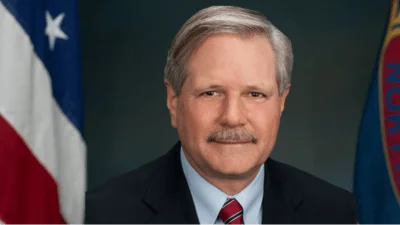Senator Kevin Cramer, US Senator for North Dakota | Senator Kevin Cramer Official website
Senator Kevin Cramer, US Senator for North Dakota | Senator Kevin Cramer Official website
WASHINGTON – Senator Kevin Cramer and Congressman Rick Crawford are leading a bipartisan effort to nullify a rule imposed by the Federal Highway Administration (FHWA) that imposes greenhouse gas (GHG) emissions performance measures on state departments of transportation and metropolitan planning organizations. The rule, which was finalized in November 2023, has been criticized as an example of federal overreach and a burden on states.
Senator Cramer, along with U.S. Senators Shelley Moore Capito and Joe Manchin, introduced a Congressional Review Act (CRA) Joint Resolution of Disapproval to overturn the FHWA rule and express Congress' objection to the federal overreach. Senator Cramer emphasized the importance of defeating this rule, stating, "Nearly half the Senate cosponsored this resolution from the onset, showing strong appetite for this rule to be defeated."
Senator Capito also expressed her opposition to the FHWA rule, stating that it limits the flexibility of states and jeopardizes critical investments, jobs, and economic growth. She emphasized that the Biden administration is neglecting the bipartisan law passed by Congress and signed by the president, and vowed to hold the administration accountable.
Senator Manchin echoed these sentiments, stating that the FHWA's rule is an example of irresponsible federal overreach and will cause economic damage to transportation industries, particularly in rural states like West Virginia. He emphasized that the administration does not have the authority to burden state departments of transportation with these emissions performance measures without Congressional direction.
Congressman Crawford, Chairman of the House Highways and Transit Subcommittee, criticized the FHWA's rule as a one-size-fits-all regulation that puts states with more small towns and rural communities at a disadvantage. He described the rule as the "heavy hand of the federal government run amok."
Chairman Sam Graves of the House Transportation and Infrastructure Committee also expressed his opposition to the FHWA's rule, stating that Congress specifically rejected the inclusion of a GHG performance measure requirement during negotiations for the bipartisan Infrastructure Investment and Jobs Act. He urged the Biden administration to implement the law as it was written.
The FHWA's rule has drawn criticism for lacking statutory authority and being unworkable. Comments from state departments of transportation and attorneys general have raised concerns or outright opposed the rule. Despite this, the agency implemented the rule, similar to a 2017 Obama administration rule that was repealed by the Trump administration in 2018.
The resolution to overturn the FHWA's rule has garnered significant support, with nearly half the Senate cosponsoring the resolution. Additional cosponsors include U.S. Senators Mitch McConnell, John Thune, and John Hoeven, among others.
Senator Cramer has been actively engaged in efforts to prevent the Biden administration from finalizing this mandate. He penned an op-ed in the Wall Street Journal highlighting the lack of statutory authority for the FHWA to issue the rule. He also introduced an amendment to defund the proposed rule and promised to introduce a CRA resolution of disapproval and support litigation to overturn the rule.
The state attorneys general of 21 states, including North Dakota, have filed litigation challenging the final rule. Senator Cramer and Senator Capito sent a letter to the FHWA expressing their strong opposition to the proposed GHG emissions performance measure, and state departments of transportation in North Dakota, Idaho, Montana, South Dakota, and Wyoming have submitted formal comments opposing the rule.
The resolution to overturn the FHWA's rule is an important step in addressing federal overreach and ensuring that states have the flexibility to prioritize their own transportation investments. With significant support in Congress, there is a strong chance that the rule will be nullified, providing relief to states burdened by this impractical and unlawful requirement.





 Alerts Sign-up
Alerts Sign-up